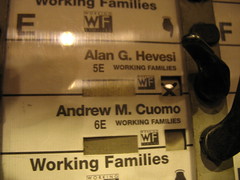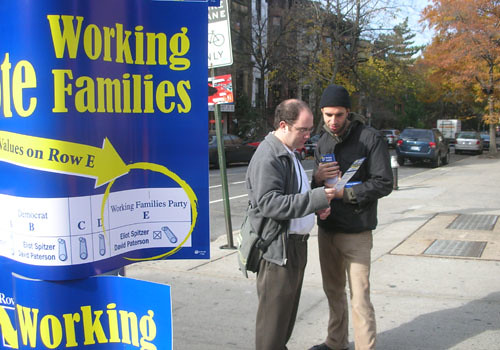Six weeks ago, the New York and Connecticut Working Families Party conducted a surveye400 independent voters, half in NY-24 and half in CT-5. The survey results guided the two parties' strategies in their independent expenditure efforts in those two districts, as well as the NY WFP programs in NY-20 and NY-29. The strategy is reflected in the direct mail posted on the NY WFP web site here.
Here, for the first time, is the internal summary of the poll results:
M E M O R A N D U M
CONFIDENTIAL – DO NOT DISTRIBUTE
TO:
CC:
FROM:
RE: NY24/CT5 Message Development Poll
DATE: October 2, 2006
This memo summarizes the results of the poll we conducted among independent voters in NY-24 and CT-5, focusing on the implications for direct mail messaging. (Independent voters here means registered voters not enrolled in any political party or, in New York, enrolled in the Independence Party).
Summary
I believe the following are the most important bits of learning for our messaging to independent voters in NY24 and CT5:
1. A significant chunk of independent voters embrace a very progressive set of issue positions (sixty to eighty percent of our target “agree 100%” with universal health care, more progressive taxation, jobs for Americans and raising the minimum wage).
2. A substantial portion of the target group has chosen their unaffiliated status because they are “independent,” or care about “candidates, not political parties.” Our messaging must grapple with the conundrum of persuading voters who vote for candidates, not parties, to vote on a particular party line.
3. At the same time, the best reason to vote WFP is to express your personal values (“vote your values”).
4. Majorities of voters willing to consider voting WFP believe that the major parties only pay lip service to issues like jobs for working people, but the hostility is significantly more pronounced to the Republican Party than the Democratic Party.
Methodology
Four hundred voters were interviewed, half from each of the two congressional districts. The following screens were applied:
· Only voters who said there were “definitely” or “probably” going to vote in the November general election were included.
o Among NY-24 voters only, the sample was limited to voters with a voter-file history of voting in at least of one of the last two general elections. (Insufficient voting history was available to use this limitation for the CT-5 segment of the sample).
· Voters who said they were “definitely” going to vote for the Republican candidate were excluded.
The telephone interviews were conducted over four days, from September 28-October 1, 2006.
The final data was weighted to reflect the gender and age mix of the projected electorate for each congressional district, and, for New York, was weighted to reflect the mix of “blank” and Independence Party registrants.
Issues
Respondents were asked if how much they agreed with seven issue propositions (using a scale of 100%, 75%, 50%, 25% or 0% agreement). The following four issues outperformed the bottom three among voters who said they would definitely or probably consider voting for a candidate o the WFP line:
· Fairer taxes
· Universal health care
· Raising the minimum wage
· Trade
| Proposition | 100% Agree |
| All Respondents | NY-24 – Open to Voting WFP | CT-5 – Open to Voting WFP |
| Working people are paying more than their fair share of taxes. Congress should make taxes fairer, so that working families get tax relief first, instead of big corporations and millionaires | 73% | 77% | 79% |
| Americans have a right to health care they can afford. Congress should make sure every American has guaranteed health care. | 72% | 75% | 73% |
| An honest day’s work should be rewarded with an honest day’s pay. Congress should raise the minimum wage. | 66% | 64% | 80% |
| We should keep good jobs in America, not send them overseas to China. Congress should stop passing unfair trade agreements that cost Americans jobs. | 65% | 70% | 72% |
| Every American has the right to a secure retirement. Congress should not privatize Social Security. | 59% | 60% | 60% |
| America should go to war as a last resort, not as a first choice. It’s time for Congress to start bringing the troops back home from Iraq. | 52% | 60% | 63% |
| Everyone should be able to go to college. Congress should make college tuition affordable for every high school graduate. | 50% | 48% | 67% |
How to Talk About Democrats and Republicans
Respondents were asked how much they agreed with about a dozen different descriptions of the Democratic and Republican parties (using a scale of 100%, 75%, 50%, 25% or 0% agreement). The top-scoring descriptions among voters who said they definitely or probably consider voting for a cross-endorsed candidate on the WFP line were:
· “I think the Republicans care a lot more about big business interests than the problems of working people.”
· “Both Democrats and Republicans say that they are for jobs. But both parties have stood by as hundreds of thousands of good jobs have left the country because of foreign outsourcing.”
· “Most politicians say they care about working families, but they really only care about getting re-elected.”
| Description | 100% Agree |
| All Respondents | NY-24 – Open to Voting WFP | CT-5 – Open to Voting WFP |
| 21. I think the Republicans care a lot more about big business interests than the problems of working people. | 47% | 53% | 55% |
| 29. Both Democrats and Republicans say that they are for jobs. But both parties have stood by as hundreds of thousands of good jobs have left the country because of foreign outsourcing. | 48% | 53% | 53% |
| 18. Most politicians say they care about working families, but they really only care about getting re-elected. | 48% | 53% | 52% |
| 23. The Republicans have been in power too long. They’ve gotten too close to the lobbyists. | 42% | 43% | 46% |
| 20. I don’t feel like I can trust the Republicans anymore | 34% | 39% | 38% |
| 27. Neither the Democrats nor the Republicans are tackling the problems that matter to me. | 39% | 44% | 29% |
| 22. I don’t think Republicans in Congress share my values. | 34% | 40% | 32% |
| 25. The Democrats have their own special interests | 41% | 38% | 34% |
| 26. I’m not 100% sure what the Democrats in Washington stand for. | 35% | 35% | 30% |
| 17. The Republican Party has become too conservative. | 31% | 33% | 33% |
| 19. The Republicans were always the ones that valued work, but I don’t think they do anymore. | 21% | 30% | 29% |
| 24. The Democrats are good on pocketbook issues that affect people like me. I just wish they wouldn’t get distracted with some of the other issues. | 21% | 25% | 31% |
| 28. The Democrats have lost touch with the values of ordinary working families. | 19% | 19% | 13% |
Disparaging statements that singled out the Democratic Party scored less well. Only the following statements obtained 75% or 100% agreement from more than half of voters who said they were at least probably willing to consider voting on the WFP line:
· “I'm not 100% sure what the Democrats in Washington stand for.” (33% agree one hundred percent, 24% agree seventy-five percent)
· “The Democrats have their own special interests.” (36% agree one hundred percent, 21% agree seventy-five percent)
The distinction that independent voters make between the Democratic and Republican Parties is foreshadowed by two early questions in the survey that ask respondents whether they hold a favorable or unfavorable (very/somewhat) view of each majority party. The Democrats do substantially better. Roughly two-thirds of our target holds a favorable view of the Democrats. Almost the same proportion holds an unfavorable view of the Republicans.
(Recall again that our survey sample excludes hard-yeses for the Republican candidates.)
| | Democratic Party | Republican Party |
| | Strongly Favorable | Favorable / Unfavorable | Strongly Favorable | Favorable / Unfavorable |
| All | 13% | 63/27 | 8% | 34/57 |
| NY24 – open to WFP | 20% | 69/22 | 6% | 28/60 |
| CT5 – open to WFP | 15% | 65/24 | 5% | 21/66 |
WFP Rationale
In order to ascertain why voters might be inclined (or how voters might be persuaded) to vote on the WFP line, survey respondents were asked:
“The Working Families Party emphasizes issues like jobs, health care and education. Which of the following reasons is the best reason to vote for a candidate running on the Working Families Party line?
To send a message to the major party candidates on a specific issue
To vote your values by supporting a candidate or party that truly reflects your values
To make sure you’re not taken for granted, and your issues are not ignored.”
“Vote your values” performed best.
| WFP Rationale | All Respondents | NY-24 – Open to Voting WFP | CT-5 – Open to Voting WFP |
| “… send a message…” | 21% | 27% | 17% |
| “… vote your values …” | 39% | 44% | 44% |
| “…make sure you’re not taken for granted…” | 20% | 15% | 24% |
As we have seen in focus group research, voters have a harder time grasping the notion that the act of voting on the WFP line “sends a message,” or are not persuaded that their message will be heard.
Targeting
On preliminary analysis, the survey yields very little data that would be useful for targeting. No subgroup was statistically significantly more likely to be willing to consider voting on the WFP line, other than:
· Lower-income Connecticut voters (<$30k and $30-50k)
· In New York, blanks compared to Independence party registrants.
The results have not yet been analyzed by geographic segments within the districts.
Miscellaneous
A few additional findings are noteworthy:
Why are Independents independent? We asked respondents to say in their own words the most important reason they did not enroll as a member of a political party. Responses were then fit into one of 11 codes.
| Reason | Among All Respondents | NY | CT | Open to Voting WFP |
| Don’t like either major party (the Democrats and the Republicans) | 13% | 15% | 12% | 12% |
| Privacy/Don’t want anyone to know | 3% | 4% | 3% | 5% |
| More conservative than either major political party | 1% | 2% | 0% | 0% |
| More liberal than either major political party | 2% | 2% | 1% | 4% |
| I am Independent | 19% | 20% | 17% | 21% |
| Lazy/Don’t want to bother | Less than 1% | 0% | 1% | 1% |
| My family (parents or spouse) | 1% | 1% | Less than 1% | 1% |
| I vote for/care about candidates, not political parties | 23% | 19% | 28% | 26% |
| I don’t care about/not interested in political parties | 5% | 3% | 6% | 3% |
| I don’t like to belong to anything. | 5% | 5% | 5% | 4% |
| Not interested in politics | 1% | 1% | 1% | 1% |



























